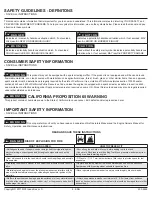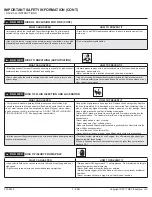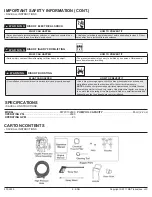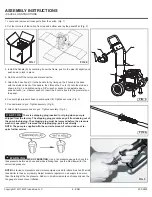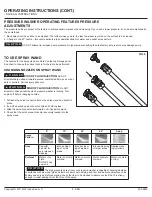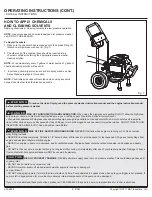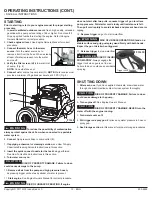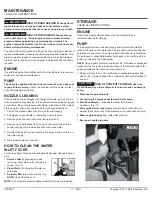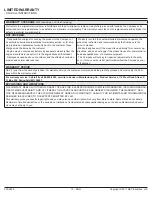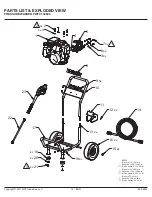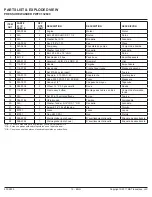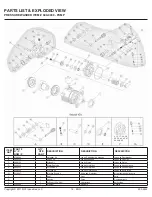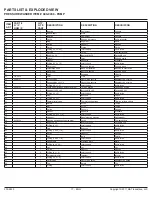
3 - ENG
Copyright © 2011 MAT Industries, LLC
200-2835
IMPORTANT SAFETY INFORMATION (CONT.)
• SAVE ALL INSTRUCTIONS
WHAT CAN HAPPEN
HOW TO PREVENT IT
• Improperly stored fuel could lead to accidental ignition. Fuel improperly
secured could get into the hands of children or other unqualifi ed persons.
• Store fuel in an OSHA-approved container, in a secure location away from
work area.
• Use of acids, toxic or corrosive chemicals, poisons, insecticides, or any kind
of fl ammable solvent with this product could result in serious injury or death.
• Do not spray fl ammable liquids.
D A N G E R
RISK OF EXPLOSION FOR FIRE (CONT.)
WHAT CAN HAPPEN
HOW TO PREVENT IT
• Breathing exhaust fumes will cause serious injury or death! Engine exhaust
contains carbon monoxide, an odorless and deadly gas.
• Operate pressure washer in a well-ventilated area. Avoid enclosed areas such
as garages, basements, etc.
• Never operate unit in a location occupied by humans or animals.
• Some cleaning fl uids contain substances which could cause injury to skin,
eyes or lungs.
• Use only cleaning fl uids specifi cally recommended for high-pressure wash-
ers. Follow manufacturers recommendations. Do not use chlorine bleach or any
other corrosive compound.
D A N G E R
RISK TO BREATHING (ASPHYXIATION)
D A N G E R
RISK OF FLUID INJECTION AND LACERATION
WHAT CAN HAPPEN
HOW TO PREVENT IT
• High-velocity fl uid spray can cause objects to break, propelling particles at
high speed.
• Light or unsecured objects can become hazardous projectiles.
• Always wear ANSI-approved z87.1 safety glasses. Wear protective clothing to
protect against accidental spraying.
• Never point wand at or spray people or animals.
• Always secure trigger lock when wand is not in service to prevent accidental
operation.
• Never permanently secure trigger in pull-back (open) position.
D A N G E R
RISK OF INJURY FROM SPRAY
WHAT CAN HAPPEN
HOW TO PREVENT IT
• Your pressure washer operates at fl uid pressures and velocities high
enough to penetrate human and animal fl esh, which could result in amputa-
tion or other serious injury. Leaks caused by loose fi ttings or worn or dam-
aged hoses can result in injection injuries. DO NOT TREAT FLUID INJEC-
TION AS A SIMPLE CUT! See a physician immediately!
• Inspect the high-pressure hose regularly. Replace the hose regularly. Replace
the hose immediately if it is damaged, worn, has melted from contacting the en-
gine, or shows any signs of cracking, bubbles, pinholes, or other leakage. Never
grasp a high-pressure hose that is leaking or damaged.
• Never touch, grasp or attempt to cover a pinhole or similar water leak on the
high-pressure hose. The stream of water IS under high pressure and WILL
penetrate skin.
• Never place hands in front of nozzle.
• Direct spray away from self and others.
• Make sure hose and fi ttings are tightened and in good condition. Never hold onto the
hose or fi ttings during operation.
• Do not allow hose to contact muffl er.
• Never attach or remove wand or hose fi ttings while system is pressurized.
• Injuries can result if system pressure is not reduced before attempting main-
tenance or disassembly.
• To relieve system pressure, shut off engine, turn off water supply and pull gun
trigger until water stops fl owing.
•Use only hoses and accessories rated for pressure higher than your pressure
washer’s PSI.


